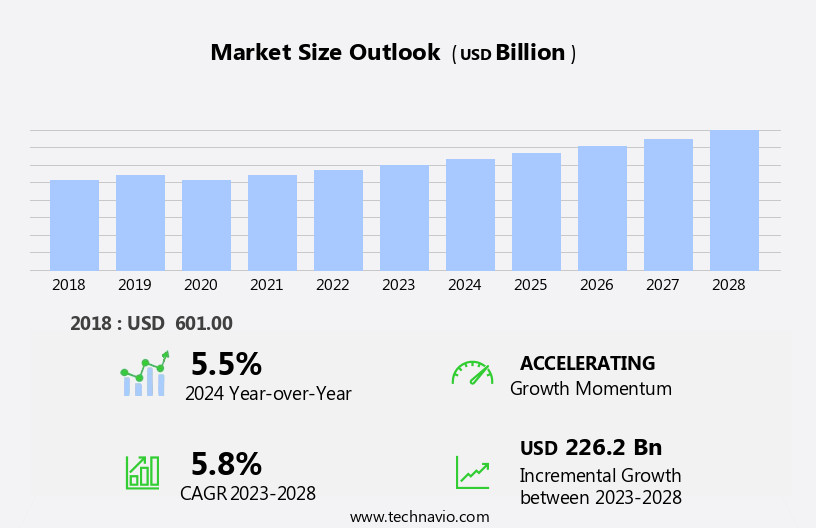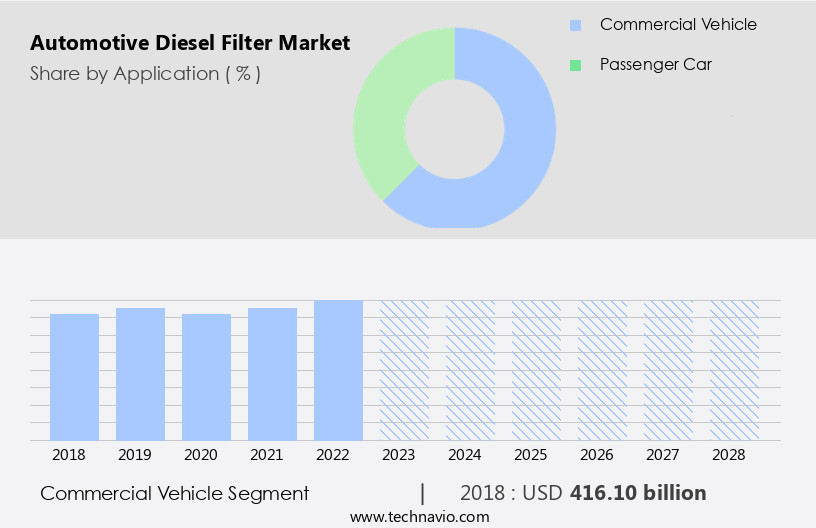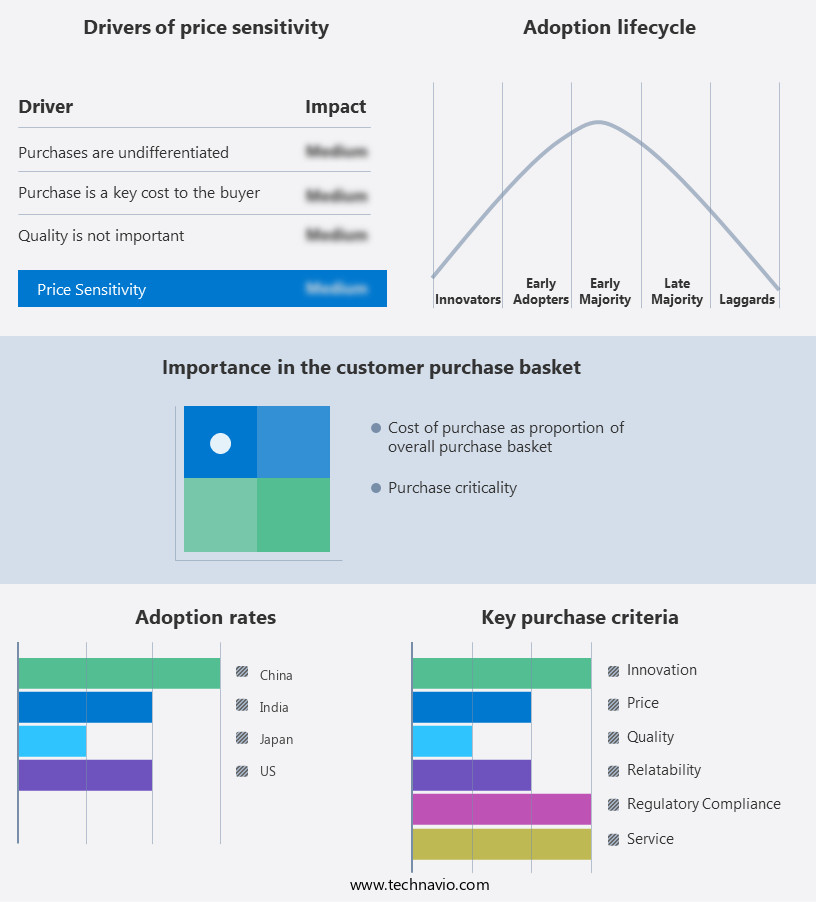Automotive Diesel Filter Market Size 2024-2028
The automotive diesel filter market size is forecast to increase by USD 226.2 billion at a CAGR of 5.8% between 2023 and 2028.
- The market is experiencing significant growth, driven by the increasing transportation of goods via roads and the rising popularity of fuel-efficient cars. With the global shift towards sustainable and eco-friendly transportation solutions, the demand for electric vehicles (EVs) is on the rise, leading to an increased focus on filtration systems that cater to their unique requirements. This trend is expected to create lucrative opportunities for market participants. However, the market is not without challenges. Stringent emission norms and regulations, coupled with the high initial investment in diesel filter technology, pose significant barriers to entry for new players. Furthermore, the growing adoption of alternative filtration technologies, such as ceramic filters and membrane filters, is intensifying competition in the market.
- Companies seeking to capitalize on market opportunities and navigate challenges effectively must stay abreast of technological advancements, comply with regulatory requirements, and focus on cost-effective solutions to cater to the evolving needs of the automotive industry.
What will be the Size of the Automotive Diesel Filter Market during the forecast period?
- The market in the United States is experiencing significant growth due to the increasing demand for clean fuel technology in the passenger car sector. Fuel filter troubleshooting and filter replacement have become essential maintenance practices to ensure the longevity and efficiency of engine components. Aftermarket filters offer cost-effective solutions for consumers, while filter innovation continues to drive market expansion. Clean air initiatives and government regulations, such as the CAFE standard and green technology, are key factors propelling the market forward. Renewable energy and the future of transportation are also influencing the market, as electric vehicle adoption and fuel filter installation in electric vehicles gain traction.
- Cartridge filters and inline filters are popular choices for fuel filter innovation, offering improved filter efficiency, longer filter lifespan, and reduced fuel consumption. Filter benefits extend beyond engine performance optimization, as they also contribute to carbon footprint reduction and engine durability. Filter production cost and filter brand reputation are critical factors for consumers, as they prioritize eco-friendly vehicles and efficient fuel system maintenance. Filter cleaning and filter installation services are also in demand, as consumers seek to optimize engine performance and reduce emissions. Overall, the market is poised for continued growth, as the automotive industry expands and emission control technology advances.
How is this Automotive Diesel Filter Industry segmented?
The automotive diesel filter industry research report provides comprehensive data (region-wise segment analysis), with forecasts and estimates in "USD billion" for the period 2024-2028, as well as historical data from 2018-2022 for the following segments.
- Application
- Commercial vehicle
- Passenger car
- Geography
- APAC
- China
- India
- Japan
- North America
- US
- Europe
- South America
- Middle East and Africa
- APAC
By Application Insights
The commercial vehicle segment is estimated to witness significant growth during the forecast period.
The market experiences significant growth due to stringent emission regulations, increasing maintenance costs, and the adoption of alternative fuels. High-efficiency fuel filters are gaining popularity as they enhance production efficiency and contribute to better vehicle maintenance. Automotive enthusiasts and consumers prioritize fuel-efficient engines, leading to an increase in demand for advanced filtration systems. The use of advanced materials in filtration media, such as synthetic filters and spin-on filters, improves engine performance and fuel economy. Regulatory bodies continue to impose emission curtailment measures, necessitating the use of advanced filtration systems to minimize pollutants and contaminants in vehicle fluids. The shift towards fuel-efficient automobiles and fuel-efficient automobile models is driving sales of automotive filters.
The aftermarket for performance filters is also growing, as consumers seek to enhance engine efficiency and reduce fuel consumption. The commercial vehicle segment, including LCVs, MCVs, and HCVs, is a significant contributor to the market's growth. Despite diesel's near-universal penetration in commercial vehicles, its adoption is lower in the Americas due to the categorization of SUVs and crossovers as LCVs. The increasing manufacturing and construction activities and the improvement of roadway infrastructure are driving the demand for roadway transportation, leading to an increase in the use of commercial vehicles and, consequently, the need for automotive diesel filters. Electric vehicles (EVs) are gaining popularity due to environmental sustainability concerns and the need to reduce operational expenses.
However, the fuel delivery system in EVs does not require filtration, limiting the market's growth potential. The aftermarket prospects for automotive filters remain strong, as consumers seek to extend the lifespan of their filters and optimize engine performance. Global emission regulations are driving the adoption of advanced filtration systems to minimize emissions and improve fuel efficiency. The use of advanced synthetic materials in filtering media and the development of long-term, high-performance filters are key trends in the market. The market's growth is also influenced by the increasing demand for durability and performance in filtration systems, particularly in demanding conditions, such as those encountered in trucks and heavy-duty vehicles.
The use of raw material combinations and the optimization of filter designs are essential to minimize the ecological footprint and reduce fuel expenses. The market's long-term demand is expected to remain strong, driven by the increasing adoption of fuel-efficient engines and the need for cleaner, more efficient filtration systems.
Get a glance at the market report of share of various segments Request Free Sample
The Commercial vehicle segment was valued at USD 416.10 billion in 2018 and showed a gradual increase during the forecast period.
Regional Analysis
APAC is estimated to contribute 67% to the growth of the global market during the forecast period.Technavio’s analysts have elaborately explained the regional trends and drivers that shape the market during the forecast period.
For more insights on the market size of various regions, Request Free Sample
The market in APAC, particularly in China, is experiencing steady growth due to the increasing sales of passenger cars and commercial vehicles. However, the growth rate is expected to decelerate in the coming years. Several factors are contributing to this trend. First, the widespread adoption and rapid penetration of electric vehicles, especially in China, are reducing the demand for diesel-powered vehicles. Second, vehicle manufacturers are voluntarily phasing out diesel models from their lineups. Third, the improved fuel quality in the region is leading to longer lifespans for automotive diesel filters. Despite these challenges, the market for automotive diesel filters remains significant due to the continued use of diesel engines in trucks and other demanding conditions.
The filters play a crucial role in maintaining peak engine performance by removing impurities, debris, and contaminants from the fuel delivery system. Advanced synthetic materials and filtering media are used to ensure high efficiency and durability, even in the face of foreign substances and engine exhaust particles. The aftermarket for automotive diesel filters also presents opportunities for growth as consumers seek to extend the lifespan of their vehicles and improve fuel economy. Global emission regulations continue to drive demand for high-efficiency fuel filters as automakers strive to meet stringent emission curtailment targets. Inline repair and replacement of fuel filters is a common practice in vehicle maintenance, and the use of spin-on filters simplifies the process.
The long-term demand for automotive diesel filters is expected to remain strong, particularly in the light commercial vehicle segment. The market is also exploring the use of advanced materials and raw material combinations to reduce the ecological footprint and improve environmental sustainability.
Market Dynamics
Our researchers analyzed the data with 2023 as the base year, along with the key drivers, trends, and challenges. A holistic analysis of drivers will help companies refine their marketing strategies to gain a competitive advantage.
What are the key market drivers leading to the rise in the adoption of Automotive Diesel Filter Industry?
- Transportation of goods by roads is the key driver of the market.
- The increasing reliance on road transportation for last-mile delivery in emerging economies, such as China and India, is driving the demand for heavy, medium, and light-duty vehicles. In China, heavy traffic congestions are a common issue due to the large number of heavy-duty trucks transporting goods. The limited availability of rail freight services in the country has compelled companies to opt for roadways as a more reliable mode of transportation. Light Commercial Vehicles (LCVs) and Medium and Heavy Commercial Vehicles (M&HCVs) are extensively used for cargo transportation in China.
- This trend is expected to continue, given the growing economy and increasing industrialization in these countries. The market is poised to benefit from this shift towards road transportation, as these vehicles require filters to ensure optimal engine performance and fuel efficiency.
What are the market trends shaping the Automotive Diesel Filter Industry?
- Growing popularity of fuel-efficient cars is the upcoming market trend.
- In response to stringent vehicular emission norms, auto manufacturers in developing countries prioritize the production of fuel-efficient, lightweight, and compact vehicles. Fuel economy has become a significant consideration for consumers, driven in part by increasing oil prices. The US established fuel economy standards as early as 1970, with Japan, China, California, and several European countries following suit by 2000. To meet these standards, OEMs focus on manufacturing fast and fuel-efficient cars by reducing the size of powertrains.
- The European Commission introduced emissions labels displaying mpg, L/100 km, and gCO2/km to aid consumers in purchasing fuel-efficient vehicles. These labels provide valuable information for consumers, enabling them to make informed decisions and contribute to reducing carbon emissions.
What challenges does the Automotive Diesel Filter Industry face during its growth?
- Rising demand for EVs is a key challenge affecting the industry growth.
- The global automotive industry is witnessing a significant shift towards electric vehicles (EVs) due to increasing environmental concerns and government initiatives. Factors such as subsidies for EVs, declining battery prices, and the introduction of cost-effective EV variants are driving the demand for these vehicles in various countries. Additionally, the expansion of EV charging infrastructure, rising consumer awareness, and regulations banning or limiting the use of fuel-powered vehicles are further fueling the growth of the EV market. Notably, China, the US, Japan, and European nations like Norway and Germany are leading the way in the adoption of EVs.
- The trend towards sustainable energy and reducing carbon emissions is expected to continue, making EVs an increasingly attractive option for consumers and governments alike.
Exclusive Customer Landscape
The automotive diesel filter market forecasting report includes the adoption lifecycle of the market, covering from the innovator’s stage to the laggard’s stage. It focuses on adoption rates in different regions based on penetration. Furthermore, the automotive diesel filter market report also includes key purchase criteria and drivers of price sensitivity to help companies evaluate and develop their market growth analysis strategies.
Customer Landscape
Key Companies & Market Insights
Companies are implementing various strategies, such as strategic alliances, automotive diesel filter market forecast, partnerships, mergers and acquisitions, geographical expansion, and product/service launches, to enhance their presence in the industry.
ALCO Filters Ltd. - The company specializes in manufacturing and supplying advanced automotive diesel filters for various vehicle types, including passenger cars, vans, and trucks. These filters ensure optimal engine performance by removing impurities, enhancing fuel efficiency, and reducing emissions. Our high-quality products cater to diverse industries and applications, reflecting our commitment to innovation and sustainability.
The industry research and growth report includes detailed analyses of the competitive landscape of the market and information about key companies, including:
- ALCO Filters Ltd.
- Anhui meiruier filter Co. Ltd.
- Avrand Pishro Co.
- BorgWarner Inc.
- Continental AG
- DENSO Corp.
- Donaldson Co. Inc.
- Dongguan Shenglian Filter Manufacturing Co. Ltd.
- First Brands Group
- General Motors Co.
- Hengst SE
- IHD Industries Pvt. Ltd.
- Liuzhou Risun Filter Co. Ltd.
- MAHLE GmbH
- MANN HUMMEL International GmbH and Co. KG
- Sewon Co. Ltd.
- Sogefi Spa
- UFI filters SPA
Qualitative and quantitative analysis of companies has been conducted to help clients understand the wider business environment as well as the strengths and weaknesses of key industry players. Data is qualitatively analyzed to categorize companies as pure play, category-focused, industry-focused, and diversified; it is quantitatively analyzed to categorize companies as dominant, leading, strong, tentative, and weak.
Research Analyst Overview
The market is experiencing significant growth due to the increasing emphasis on emission standards and the rising popularity of high-efficiency fuel filters. These filters play a crucial role in maintaining the performance and durability of internal combustion engines by removing contaminants and impurities from the fuel. Emission standards continue to evolve, driving the demand for advanced filtration systems in both OEM and aftermarket applications. The use of alternative fuels, such as biodiesel and natural gas, further increases the importance of fuel filters in ensuring optimal engine performance and fuel efficiency. Maintenance costs are a significant operational expense for vehicle owners, making the durability and production efficiency of fuel filters a critical consideration.
Automotive enthusiasts and commercial fleet operators alike seek filters that can withstand demanding conditions and provide long-term performance. The automotive industry is responding to these trends by investing in the development of high-performance filters made from advanced synthetic materials. These filters offer improved filtration capabilities, longer lifespan, and better resistance to wear and tear. The shift towards fuel-efficient engines and vehicles is also driving demand for fuel-efficient automobiles and fuel filters. As consumers become more environmentally conscious, the ecological footprint of their vehicles becomes a key consideration. Fuel filters play a vital role in ensuring that vehicles operate at peak engine performance while minimizing fuel consumption and emissions.
Regulatory bodies continue to enforce strict emission curtailment measures, putting pressure on automakers to produce cleaner vehicles. This trend is leading to the widespread adoption of filtration systems that can effectively remove engine exhaust particles and other pollutants. The aftermarket for automotive filters is also growing, with consumers seeking to improve the performance and longevity of their vehicles. Aftermarket performance filters offer enhanced filtration capabilities and improved flow rates, making them an attractive option for consumers looking to optimize their vehicle's fuel delivery system. The use of spin-on filters and cartridge-style filters is becoming increasingly common in both OEM and aftermarket applications.
These filters offer easy installation and replacement, making them a popular choice for vehicle maintenance. The rise of electric vehicles (EVs) is also impacting the market. While EVs do not require traditional fuel filters, they do require filtration systems for their battery cooling systems and other fluid delivery systems. This presents new opportunities for filter manufacturers to innovate and develop new filtration technologies. In , the market is experiencing significant growth due to the increasing emphasis on emission standards, fuel efficiency, and vehicle performance. The development of advanced filtration technologies and materials is driving innovation and competition in the market, making it an exciting space to watch.
|
Market Scope |
|
|
Report Coverage |
Details |
|
Page number |
172 |
|
Base year |
2023 |
|
Historic period |
2018-2022 |
|
Forecast period |
2024-2028 |
|
Growth momentum & CAGR |
Accelerate at a CAGR of 5.8% |
|
Market growth 2024-2028 |
USD 226.2 billion |
|
Market structure |
Fragmented |
|
YoY growth 2023-2024(%) |
5.5 |
|
Key countries |
China, US, Japan, and India |
|
Competitive landscape |
Leading Companies, Market Positioning of Companies, Competitive Strategies, and Industry Risks |
What are the Key Data Covered in this Automotive Diesel Filter Market Research and Growth Report?
- CAGR of the Automotive Diesel Filter industry during the forecast period
- Detailed information on factors that will drive the growth and forecasting between 2024 and 2028
- Precise estimation of the size of the market and its contribution of the industry in focus to the parent market
- Accurate predictions about upcoming growth and trends and changes in consumer behaviour
- Growth of the market across APAC, North America, Europe, South America, and Middle East and Africa
- Thorough analysis of the market’s competitive landscape and detailed information about companies
- Comprehensive analysis of factors that will challenge the automotive diesel filter market growth of industry companies
We can help! Our analysts can customize this automotive diesel filter market research report to meet your requirements.




